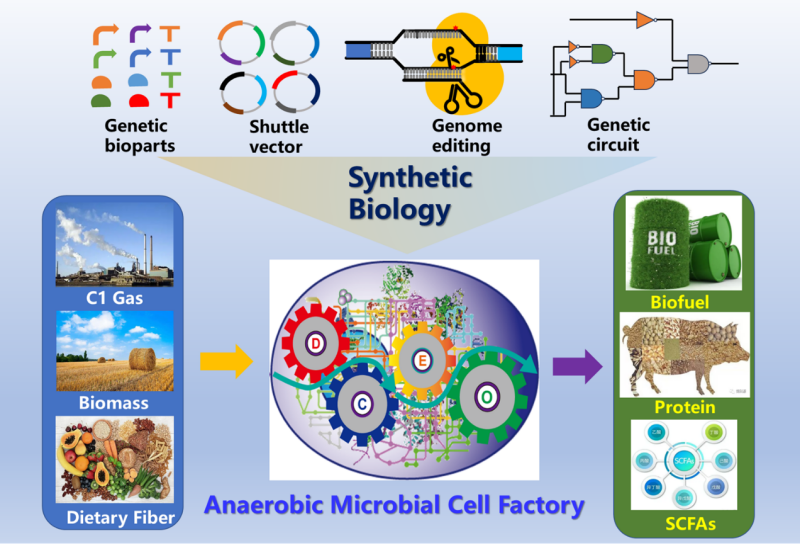The Qingdao Institute of Bioenergy and Bioprocess Technology has recently published an important review in the field of anaerobic bacteria synthetic biology
Anaerobic microorganisms play crucial roles in human health and microbial green manufacturing. Although techniques such as 16S rRNA analysis and multi-omics approaches have been widely used to study the association between microbial metabolites and host biology, a deeper understanding of the mechanisms underlying the interactions between metabolites and the host/microbiota is required. To gain this knowledge, it is necessary to have relevant genetic manipulation tools for these symbiotic bacteria. Considering the close relationship between these two groups of bacteria and human health, and the availability of the majority of their genome sequences.
Qingdao C1 refinery engineering research center, QingDao institute of bioenergy and bioprocess technology has focused on the development of genetic editing tools for gut anaerobic bacteria, including Bacteroides spp. and Clostridium spp.
This work was published in Biotechnology Advances on 14 October 2023.
The review paper provides a systematic summary and outlook on the development and application of genetic editing tools for Bacteroides spp. and Clostridium spp. in the field of biotechnology.
Currently, regulatory gene expression systems, including constitutive and inducible promoters, have been developed for some Bacteroides spp. and Clostridium spp. In addition, gene knockout systems based on homologous recombination, transposons, and phage integrases have been established, along with genome editing tools based on the CRISPR-Cas system. These tools enable fast and efficient editing of Bacteroides spp. and Clostridium spp.
Moreover, these synthetic biology tools allow us to gain a deeper understanding of the microbial-host and microbial-microbial interactions mediated by small molecule metabolites and enable more rational manipulation of the microbiome for biotherapeutic purposes.
Building upon this foundation, the authors also discuss future perspectives for microbiome editing tools and synthetic biology research: (1) the development of novel CRISPR-Cas-based genome editing tools, such as CRISPR-based base editing and transposon-related CRISPR-Cas systems, which need further improvement to enhance editing efficiency; (2) the traditional genetic methods rely on manipulating individual species and still face many challenges. There is a need to develop in situ microbiome editing tools; (3) the strain engineering of Bacteroides thetaiotaomicron and Clostridium sporogenes is still in its early stages.
Their genomes are poorly understood, and synthetic biology tools are needed to study the functions, expression regulation, interaction networks of their genomic genes, and their impact on host biology. This knowledge is crucial for designing targeted effect molecules, sensors, and gene circuits.

(Image/Text by TAN Yang)
Contact:
KONG Fengru
Qingdao Institute of Bioenergy and Bioprocess Technology, Chinese Academy of Sciences
Tel: 86-532-58261072
E-mail: kongfr@qibebt.ac.cn